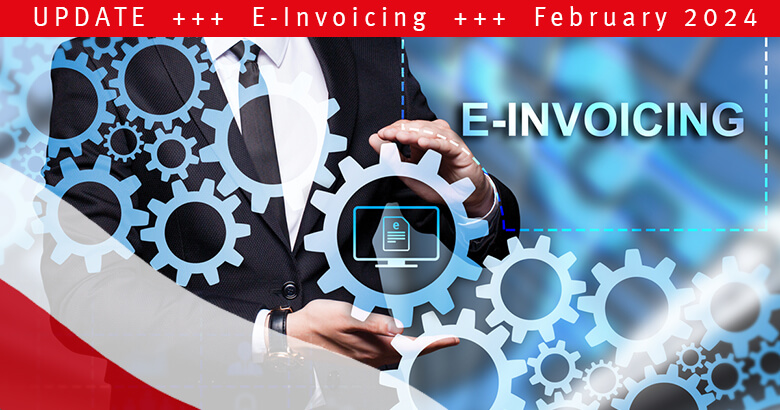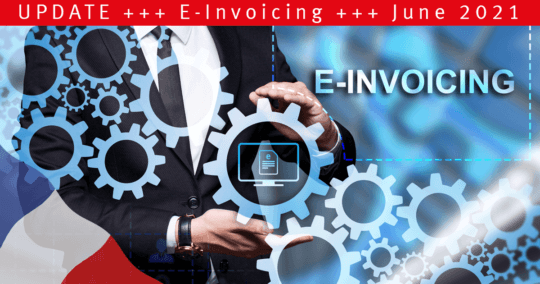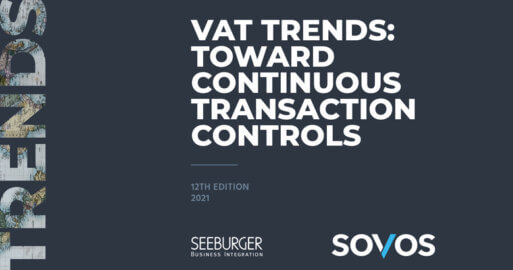Poland plans clearance B2B e-invoicing

+++ Update February 2024: Mandatory KSeF still to be implemented – new schedule expected in spring
During a meeting with representatives of the government and other involved organizations in early February, Minister of Finance Andrzej Domański outlined the current plans regarding the implementation of the mandatory KSeF that was postponed in January:
- The mandatory KSeF will definitely be implemented.
- On February 9, the Ministry of Finance announced a schedule of consultations on legal solutions and the functionality of the KSeF system.
- At the turn of April and May, a new date for the mandatory use of KSeF will be indicated.
- From the turn of April and May, each of the 400 tax offices will offer practical training in the use of free software for issuing e-invoices.
Representatives of the ministry emphasized that the commencement of consultations does not mean that work on legal solutions and system functionality will start from the beginning. When analyzing proposals for possible changes, they will also look at them in terms of costs for entrepreneurs, since they have already put a lot of effort and resources into preparing the use of KSeF.
SEEBURGER will follow further developments and provide regular updates in this blog and on the SEEBURGER homepage.
+++
+++ Update January 2024: There will be no mandatory KSeF in 2024
On 19 January 2024, the Polish Ministry of Finance announced that critical errors had been found in the KSeF that will prevent the system from being introduced in 2024.
The exact consequences and new timetables have not yet been announced. Initially, an external audit will be carried out to analyse the existing problems in the code, functions and performance of KSeF.
SEEBURGER will follow further developments and provide regular updates in this blog and on the SEEBURGER homepage.
+++
+++ Update December 2023: Poland Advances B2B E-Invoicing Implementation: Updates on KSeF System Obligation
Introduction
In our previous blog post we highlighted Poland’s ambitious plan to introduce mandatory B2B e-invoicing. As we approach the final stretch of the year, significant developments in the regulatory landscape necessitate an update on the progression of the KSeF (Krajowy System e-Faktur) system. The Polish Ministry of Finance (MoF) has initiated public consultations on pivotal changes, inviting taxpayers to provide their insights. This update delves into the latest developments stemming from these consultations and sheds light on the proposed amendments to the KSeF system.
Public consultations on KSeF system obligation
As of November 24, 2023, the Ministry of Finance (MoF) made two draft regulations on the use of the National e-Invoicing System KSeF available for consultation to the public (No. 826 and No. 827 on the list of legislative works). The drafts are proposing updates on crucial aspects, including QR code generation, offline invoicing, and KSeF authorizations. Taxpayers are encouraged to share their comments within three weeks, in response to two implementing drafts that the MoF is proposing.
Draft regulation no. 826: Amendment on issuing invoices
The draft focuses on amendments related to issuing invoices, introducing changes effective January 1, 2025. Key highlights include:
-
NIP inclusion for VAT-exempt taxpayers:
Starting from January 1, 2025, VAT-exempt taxpayers are required to include the NIP (tax identification number) of both the buyer and the supplier on KSeF invoices.
-
Invoices for continuous services:
In the case of invoices for continuous services, such as the supply of utilities, certain elements must be excluded, such as the measurement and quantity of goods delivered or the scope of services provided. Additionally, unit prices without tax (net unit prices) are not to be included.
Draft regulation no. 827: Technical regulation for KSeF
The draft encompasses technical regulations for KSeF, introducing several key provisions aimed at enhancing the functionality and security of the system. Notable points include:
-
Expanded anonymous access:
The proposal suggests expanding anonymous access to invoices, particularly in contingency mode during system failures and unavailability, with a focus on VAT RR invoices and VAT RR corrective invoices.
-
QR code generation:
QR codes will now be generated both in the standard ‘KSeF online mode’ and during contingency situations (without connection to KSeF in ‘KSeF offline mode’). The MoF plans to release specifications, including QR technical requirements, in the following days.
-
KSeF authorization and authentication:
The scope of authorization is set to broaden, now including flat-rate farmers as eligible taxpayers. Additionally, enhanced security measures for authorized tokens are in the pipeline, with tokens generated before July 1, 2024, being valid until December 31, 2024.
Submitting feedback:
Interested parties are encouraged to submit their responses electronically, also in editable form to: Sekretariat.PT@mf.gov.pl.
As Poland strides toward the implementation of B2B e-invoicing, these proposed changes to the KSeF system underscore the government’s commitment to modernize and streamline financial processes. We are now waiting for the technical specifications of the QR code to be released soon. Stay tuned for further updates as we continue to monitor and navigate the evolving landscape of electronic invoicing in Poland.
+++
+++ Update Poland June 2023: New version of the logical structure of the FA(2) planned for September 2023+++
The Ministry of Finance in Poland plans to bring a new version of the FA(2) logical structure into effect from 1 September 2023.
The news was published on 23 May 2023, together with a draft version of FA(2) and projects the following timeline for the project:
- June 2023: Publication oft he logical structure on ePUAP
- July 2023: Test environment for new version available
- 1 September 2023: Production environment available.
A delta-analysis highlighting the changes from FA(1) to FA(2) (based on draft version FA(2)) can be found here.
+++
+++ Update Poland February 2023: B2B E-Invoicing with KSef likely to be postponed to 1st July 2024
On 2nd February 2023, the Polish finance ministry published changes to the draft for the planned national e-invoicing system (KSeF) for Poland.
This is an updated draft bill from 31st January 2023 following an intense public consultation period on the original draft bill to introduce an e-invoicing mandate using KSeF. This draft law has extensively incorporated feedback and requests from business associations, accountants and auditors, the IT sector and the Ministry of Infrastructure.
Suggested changes to the KSeF specifications:
- The new e-invoicing law to come into force on 1st July 2024.
- Vat-exempt taxpayers will need to comply with the e-invoicing mandate from 1st January 2025.
- Changes to the scope:
- The following are no longer in the scope of the bill:
- B2C E-Invoices and
- Tickets that fulfil the function of an invoice, including receipts for toll roads.
- Till receipts and simplified invoices to comply with the e-invoicing mandate from 1st January 2025.
- The following are no longer in the scope of the bill:
- If the taxpayer should experience technical issues, it is possible to issue invoices offline outside the KSeF and deliver the invoice to the KSeF the following day.
- The sanctions have been loosened and will only apply from 1st January 2025.
+++
+++ Update Poland June 2022: Mandatory E-Invoicing in Poland as of January 2024
On 17th June this year the Council of the European Union has agreed to make electronic invoicing in Poland mandatory from January 1, 2024. Find all the details on the website of the Polish Ministry of Finance.
+++
+++ Update Poland: Derogation from VAT Directive requested – e-invoicing mandate will come into force at the earliest in Q2/2023
A proposal for an implementing decision authorising mandatory e-invoicing has been submitted to the Council. According to the proposal, a derogation is to be granted so that all transactions for which an invoice must be issued under Polish VAT law must be processed via the national system for electronic invoicing (Polish: Krajowy System e-Faktur – KSeF). This regulation is to apply to all taxable persons established in Poland. In addition, taxable persons must also submit specific information to the KSeF on transactions for which invoices do not have to be issued under Polish VAT rules. These include, for example, the intra-Community acquisition of goods and the cross-border provision of services.
If approved, the derogation would apply from 1 April 2023 to 31 March 2026. This means that the Polish e-invoicing mandate will come into force in the second quarter of 2023 at the earliest.
The proposal is currently being examined by the European Commission and can be viewed at the following link: https://eur-lex.europa.eu/legal-content/EN/TXT/HTML/?uri=CELEX:52022PC0136&from=EN
+++
+++ Update Poland: Introduction of Clearance E-Invoicing System delayed to 2022
On 6th August 2021, the Polish Ministry of Finance announced on their website that the introduction of the Polish CTC e-invoicing clearance system will be delayed to January 2022 (initially scheduled for October 2021). And draft versions of the e-invoicing XML standards are now available in Polish and English – including a set of sample invoices.
+++
The race towards Continuous Transaction Controls (CTC) in Europe is continuing at an increasing pace. It started with Spain, Portugal and Italy making it compulsory to use business-to-business (B2B) e-invoicing either in a clearance model or with real-time electronic VAT reporting. On the 17th of December 2020, the Polish Ministry of Finance announced that Poland will be the fourth country in the European Union to introduce B2B e-invoicing. A central governmental platform for e-invoicing is being made available
- to be used voluntarily from the end of 2021,
- with usage obligatory from 2023.
Poland stipulates B2B e-invoicing via a central platform from 2023
Poland, where B2G e-invoicing has been mandatory for suppliers since 2020, is now joining the club of the European CTC countries. Lessons learnt both from Italy legally requiring business to use their SdI exchange system for e-invoicing and the experience of other countries will help Poland to avoid certain pitfalls when introducing their own CTC platform, the centralised national system for e-invoices “Krajowego Systemu e-faktur (KSeF)”.
The main motivation is to combat tax fraud, and to collect the VAT owed by taxpayers more efficiently. In the midst of a global pandemic, collecting VAT owed has become particularly important. In this regard, Poland has already made significant progress in combating VAT fraud by employing SAF-T files (known in Poland as JPKs) and the fraud flagging system STIR to enable electronic VAT reporting, including for data from electronic cash registers, over the past years. Taxpayers are required to submit SAF-T reports to the Polish Tax Authority on a monthly basis. However, SAF-T reporting is not in real-time as continuous transaction controls are. Furthermore, SAF-T reporting does not automate sending and processing invoices as efficiently for businesses as electronic invoicing based on XML-e-invoices does.
Both the Polish Tax Authority and Polish businesses benefit most when XML e-invoices follow one national standard with a single centralised system automatically logging and checking all invoices.
Objectives and benefits
- The Polish Ministry of Finance says on their website that they want to be at the forefront of Europe as a pioneer of modern solutions for companies. If e-invoicing proves successful, they can replace the current SAF-T JPK reporting obligations. This perspective improves the conditions for taxpayers to do business through easier and faster access to documents while simultaneously providing more timely VAT information to the Polish tax administration.
- The Polish tax authorities particularly want to gain real-time information on VAT invoices in order to combat VAT carousel fraud more quickly and effectively. At a time when European countries were expecting there to be an annual VAT gap of more than 140 billion Euro for 2018, potentially significantly higher in 2020 due to the effects of COVID-19, it has become imperative to secure state funding by collecting this missing VAT – sooner rather than later. The expected increase in VAT revenue in Poland is expected to primarily come from combatting dishonest bookkeeping.
- The Polish Ministry of Finance wants to introduce a reliable e-invoicing system – first on a voluntary basis, later becoming mandatory – based on the experience of the other European forerunners Italy, Spain and Portugal. This approach will allow taxpayers a smooth start on a voluntary basis from the end of 2021 – in which they will benefit from a shortened VAT refund period of 40 days instead of 60 – before e-invoicing becomes mandatory.
The details of the e-invoicing system for B2B invoices in Poland have not yet been determined. It’s due to remain a hot topic in European e-invoicing for the next 2 years at least, as we follow Poland’s clear attempt to beat France in the CTC race.
Summary
Among the EU member states, Poland is one of the forerunners in implementing a governmental exchange system for mandatory B2B e-invoicing. This would allow VAT information to be monitored and checked more quickly and effectively. We are seeing a trend in compulsory B2B e-invoicing in Europe led by Italy, Spain, Portugal, Hungary and France. Presumably, other EU countries will follow – just as e-invoicing has both started and spread throughout Latin America within the last ten years or so.
The challenge will be to consider and implement each country’s individual legal requirements
- without having to deal with several different local providers in the countries involved,
- ensuring you meet the various technical requirements in inbound and outbound invoicing, such as stipulated data formats and communication channels,
- and simultaneously maintaining an easy and reliable connection to the respective ERP systems.
The SEEBURGER BIS E-Invoicing Solution provides control of the processing of incoming and outgoing invoices as well as extensions for deep process integration within any ERP systems. This includes the seamless integration of SAP S/4HANA via the SAP API Business Hub. We are an established provider of cloud services with many years’ experience of understanding and meeting the various requirements in different countries in the EU and elsewhere with a single-source solution.
Thank you for your message
We appreciate your interest in SEEBURGER
Get in contact with us:
Please enter details about your project in the message section so we can direct your inquiry to the right consultant.
Written by: Gerrit Onken
Gerrit Onken has been at SEEBURGER since 2010 as a product manager for software applications and for electronic data exchange services for the business sector. He focuses on solutions for SAP, electronic invoicing (e-invoicing) and innovations for digitalizing business and technical processes for globally-active customers. Originally a banker, Gerrit Onken went on to graduate in business administration, majoring in industrial management and business informatics. After working in the financial sector, he worked as a manager and project manager from 2004 to 2010 for one of the top five corporate consultancies, working with international BPOs in the banking and automotive industries.





